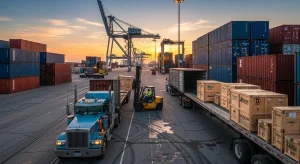The U.S. trucking industry continues to undergo changes under the new administration.
Sean Duffy, new Secretary of the U.S. Department of Transportation
With 77 votes in favor and 22 against, the U.S. Senate approved the nomination of Sean Duffy as Secretary of the Department of Transportation. The former congressman from 2011 to 2019 was chosen due to his bipartisan popularity and support in the road transportation industry, despite lacking extensive experience in the sector. During his confirmation hearing, Duffy emphasized that he would focus on improving infrastructure, innovation, and safety, prioritizing efficiency in spending funds and reducing bureaucracy in critical infrastructure projects.
Despite his lack of direct experience in transportation, Duffy gained support from various organizations, such as the Owner-Operator Independent Drivers Association (OOIDA) and the American Trucking Associations (ATA), which highlighted his commitment to addressing the needs of truck drivers, particularly in fighting burdensome regulations and improving conditions for small businesses. His nomination was also unanimously approved by the Senate Committee on Commerce, Science, and Transportation.
In addition to his focus on infrastructure and safety, Duffy has earned the backing of key figures in the road transportation industry due to his record of supporting policies favorable to small businesses. His ability to work in a bipartisan manner and his commitment to reducing regulations have been key factors in his confirmation, which was seen as a positive sign for the future policies of the Department of Transportation.

Vehicle emissions legislation in California continues legal battle
The Trump administration has requested the Supreme Court to suspend a lawsuit challenging California’s exemption from stricter vehicle emissions standards. This case has attracted attention from those involved in similar litigation, such as challenges to the Advanced Clean Trucks regulations. The request was made by James Payne, Acting Administrator of the EPA, following an executive order from Trump aimed at eliminating the “electric vehicle mandate” and delaying lawsuits while agencies review which regulations to pursue. At the center of this case is California’s exemption for Advanced Clean Cars, which sets stricter standards for passenger vehicles from 2017 to 2025.
This case could have repercussions for other similar regulations, such as those for Advanced Clean Trucks, since both of California’s exemptions are interrelated. In December 2022, the Biden EPA granted exemptions to California for Advanced Clean Cars II and the Heavy-Duty Omnibus, which required that all new vehicles sold in the state by 2035 be zero-emissions. The exemptions also include stricter restrictions on truck emissions. These regulations could be overturned if Trump’s executive order is implemented. The uncertainty about the future of these exemptions remains a key issue, as the EPA has not yet announced decisions on the matter.

Transportation regulations on hold due to Trump’s mandate
President Donald Trump has implemented a “regulatory freeze” that delays the enforcement of several rules, including one requiring automatic emergency braking (AEB) systems in new light vehicles. According to a notice published by the National Highway Traffic Safety Administration (NHTSA) on January 27, the rule has been postponed until March 20. This measure follows a memorandum issued by Trump on January 20, which orders the suspension of new regulations, the withdrawal of those not yet published in the Federal Register, and the delay of already published ones.
The final NHTSA rule, which requires all new light vehicles to be equipped with AEB technology, was scheduled to take effect in September 2029. This rule also includes AEB systems for pedestrians and forward collision warning. The regulatory freeze will allow for an additional comment period or an extended delay. Additionally, a similar rule for heavy vehicles that would require AEB systems is under review, but this proposal was never published in the Federal Register, making its future under the new administration uncertain.
The delay also affects other regulations involving the transportation industry, such as minimum training requirements for commercial drivers, autonomous driving systems, and hair testing for drug detection. These rules, which were being reviewed by the White House Office of Management and Budget, were withdrawn on January 21. The freeze has raised concerns among some sectors, such as truck drivers, who have pointed out deficiencies in current AEB technologies, citing cases of false activations that could create additional risks on the roads.


Lunar New Year 2026: Ancient Traditions, Renewed Energy, and Massive Celebrations
Lunar New Year 2026 begins on February 17 under the sign of the Fire Horse and is marked by spiritual rituals, family reunions, and large-scale celebrations in both China and the United States, especially in California.

Freedom 250 Grand Prix: How Logistics and Transportation Will Power the Race in Washington
The first-ever IndyCar street race in Washington, D.C., scheduled for August 21–23, will headline the United States’ 250th anniversary celebrations — and it will trigger a massive transportation, freight, and urban logistics operation behind the scenes.

Groundhog Day: What It Means for Trucking When “Phil Sees His Shadow”
The forecast from America’s most famous groundhog is calling for more winter — and that’s an important signal for the trucking industry and cold-season route planning

Love on the open road: the best dating apps for truckers
If you’re looking for someone to go the long haul with, here are the best dating apps for truck drivers. They say love is everywhere…

The most congested cities in the U.S. and the world in 2025
The annual TomTom Traffic Index produces a ranking of the most congested cities in the world. The annual TomTom Traffic Index presents an analysis of

Steady Growth Signals Strong Momentum in the U.S. Trucking Industry
Trucking growth in the United States is gaining strength in 2026, driven by higher freight demand, expanding logistics activity, and new opportunities for carriers and fleet operators.
